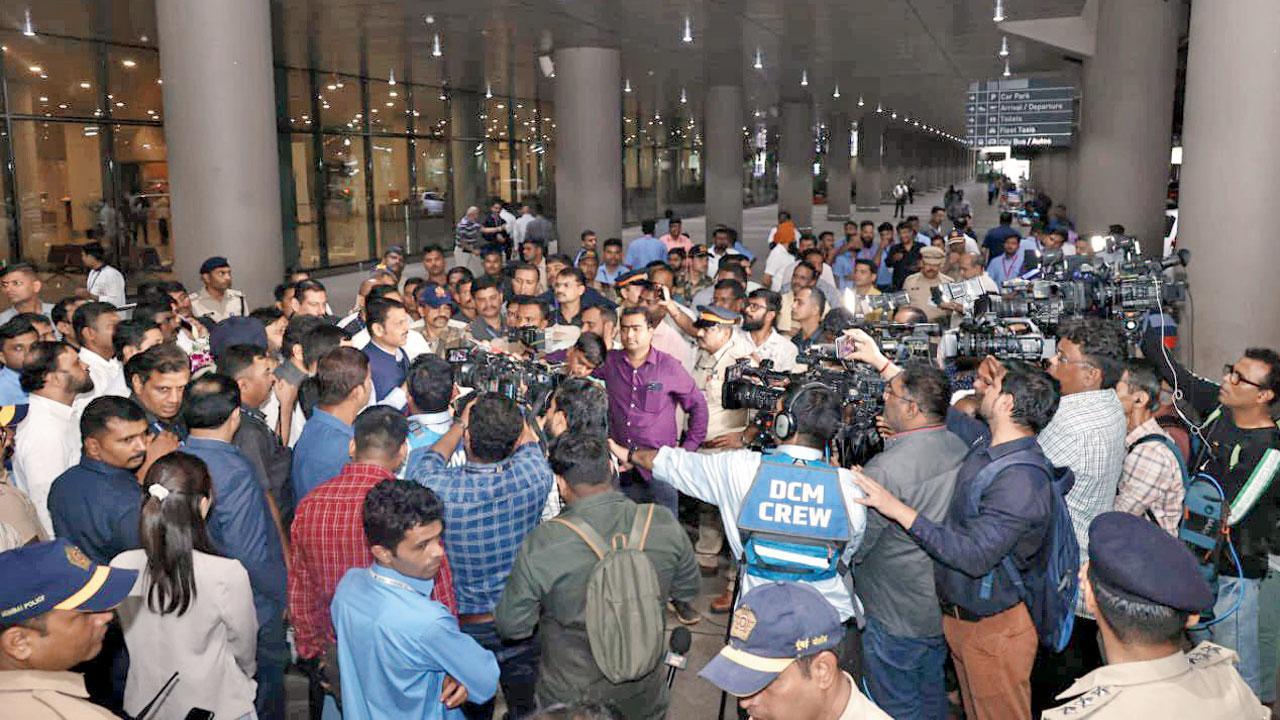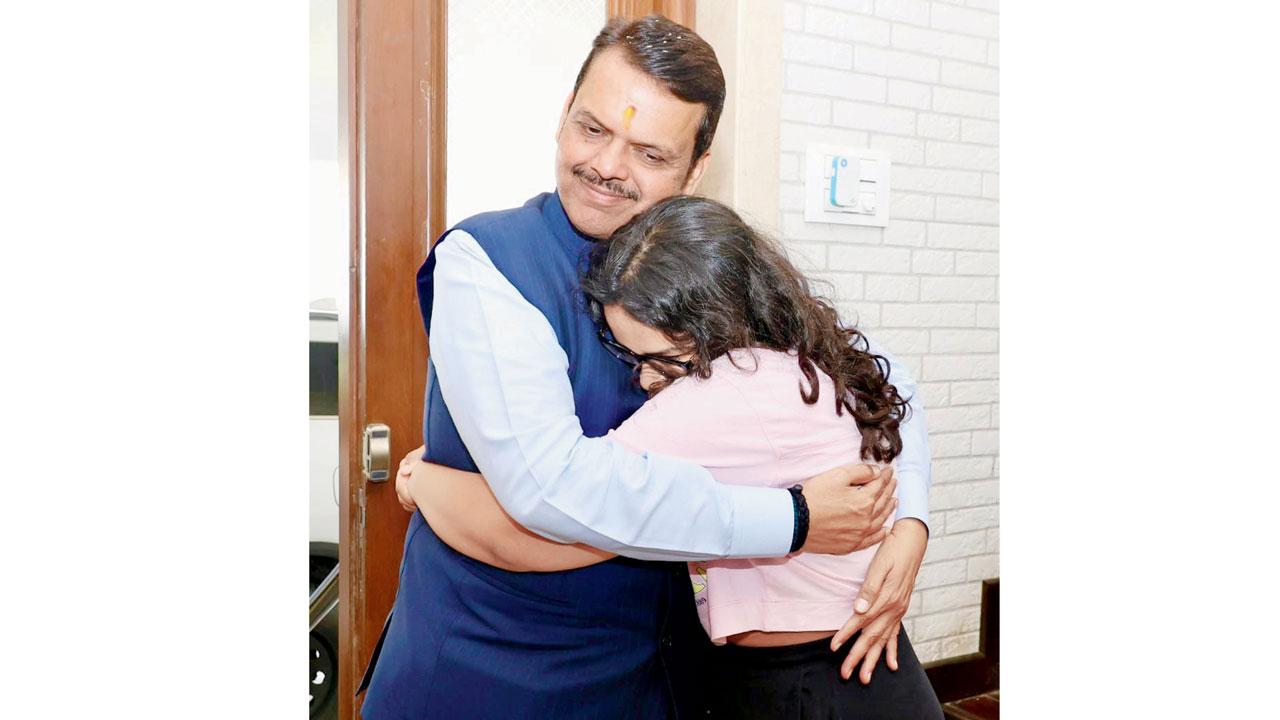Deputy Chief Minister Devendra Fadnavis returns from the land of the rising sun with a bouquet of big-ticket announcements and more campaign material for the party that says it has delivered the most for the city since 2014

BJP workers gather to welcome Deputy CM Devendra Fadnavis at Mumbai airport
 Devendra Fadnavis, the man, whom we had called a reluctant deputy CM last year during the unprecedented power shift, has embarked on a mission to fulfil a vision that he had shared as the then CM, especially in terms of Mumbai’s infrastructural makeover. His second visit to Japan last week, the first was as head of the state, has widened the collaboration between Maharashtra and Japanese agencies (infra and financial), industries, educational institutions and Indian diaspora. This visit becomes important because the Japanese government had invited Fadnavis, the first ever from Maharashtra to get such an honour. He landed in Mumbai to a rousing welcome from hundreds of party workers and leaders. His arrival marked a bouquet of announcements that he is expected to see to their logical end, just like the ones he had made eight-nine years ago.
Devendra Fadnavis, the man, whom we had called a reluctant deputy CM last year during the unprecedented power shift, has embarked on a mission to fulfil a vision that he had shared as the then CM, especially in terms of Mumbai’s infrastructural makeover. His second visit to Japan last week, the first was as head of the state, has widened the collaboration between Maharashtra and Japanese agencies (infra and financial), industries, educational institutions and Indian diaspora. This visit becomes important because the Japanese government had invited Fadnavis, the first ever from Maharashtra to get such an honour. He landed in Mumbai to a rousing welcome from hundreds of party workers and leaders. His arrival marked a bouquet of announcements that he is expected to see to their logical end, just like the ones he had made eight-nine years ago.
ADVERTISEMENT
As credit must be given where it is due, Fadnavis had been able to change the perception that CMs, mostly coming from places other than Mumbai, did not bother much to upgrade the city’s living conditions and rapid transport system, among other things. Citizens surviving here despite the hardships have done so solely owing to the ‘Mumbai spirit’ even as successive governments, state and civic, did not live up to expectations. The Shanghai dream died early, but not before adding to the city’s woes.

Deputy CM Devendra daughter Divija hugs Fadnavis upon his arrival in the city from Japan
Fadnavis had his share of criticism, protests and allegations while he pursued Mumbai projects while he was the CM. And, when political circles thought his wings were clipped, his status in the hierarchy downgraded and powers weakened—firstly with the advent of Eknath Shinde, followed by the entry of Ajit Pawar—DyCM Fadnavis took off for Japan (of course after having due consultations with Shinde) to gain an upper-hand in the contest of the three power centres. From Japan, he intervened to resolve the onion export related crisis and went public with a declaration much before the CM and the other DyCM did. Similarly, he did not wait to return to India to instruct officials to work on a dedicated cell to deal with Japanese investors. He held an online meeting with bureaucrats to explain to them the urgency of forming the exclusive cell.
Mumbai, the financial capital of the country, has always been important politically. The BJP has risen here fighting a traditional rival Congress and ally Shiv Sena. When the Congress lost its strength and Sena became vulnerable, the BJP set out to unseat the frenemy. BJP almost threw the Sena out of the BMC after the city boosted it phenomenally in the 2017 municipal polls during the Fadnavis government. The campaign relied on showcasing development and allegations against its ruling partner, Sena (unified) that was later allowed to install its mayor.
In the Vidhan Sabha as well, Mumbai preferred the BJP and Sena again, the former winning more seats. Development and welfare schemes, along with PM Narendra Modi’s persona, are going to be the BJP’s main weapons in the state that will go to the polls later this year and ahead of the Lok Sabha. With the Opposition bloc gaining momentum—it will meet in Mumbai over this weekend—the Mahayuti of BJP, Sena (Shinde) and NCP (Ajit faction) have been following the same model: talk development and welfare and pepper public speeches with Modi charisma. Ajit Pawar’s speech in Baramati on Saturday, his first at his native place after the break-up, revolved around the same theme. Calling Modi an unparalleled leader, Ajit attributed his separation from uncle Sharad Pawar to the vision of the two-time PM.
Fadnavis has brought more cheers to his Mumbai party colleague, who can now add to their campaign the much-awaited Versova-Virar sea link, Mumbai’s flood mitigation project and Wadala-CSMT underground Metro line that have been promised all assistance by Japan. No need to say that permissions and assistance required from New Delhi will come quickly. City Metro projects that are operational, nearing completion and in different phases of construction will remain the salient points of BJP’s campaign agenda. Part of the city’s first underground Metro-3, and full-length trans-harbour link, a nearly-dead project that was revived by Fadnavis is expected to be operational by end of this year. Expect a show-stopper event when these projects are dedicated to the city, most likely by PM Modi.
Dharmendra Jore is political editor, mid-day. He tweets @dharmendrajore
Send your feedback to [email protected]
 Subscribe today by clicking the link and stay updated with the latest news!" Click here!
Subscribe today by clicking the link and stay updated with the latest news!" Click here!







